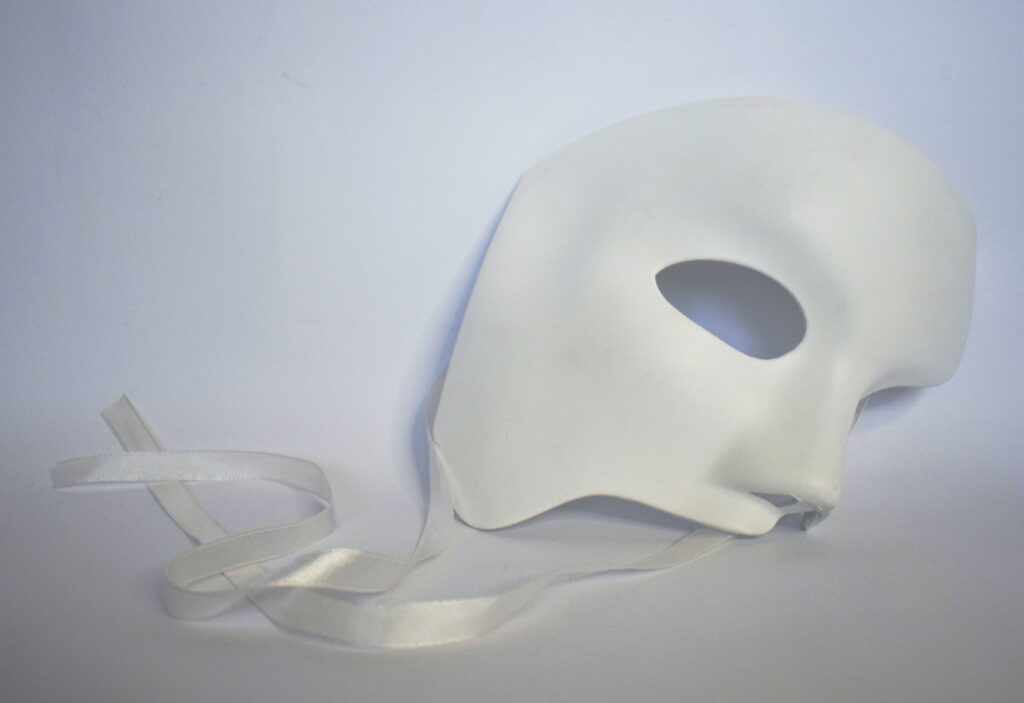Emotional Masking: The Guilt That We All Share
September 19, 2021
By counselingwithnatalie
September 19, 2021
By counselingwithnatalie
The concept of a “mask” far precedes the current day. Present throughout the history of humanity, from their origins in tribal and cultural practice, to being implemented in Shakespearean theater, masks have held innumerable places in associated culture and the lifestyles founded within. What is often invisible to the eye, however, is how vastly present it is in current society. This truth exists because, ironically enough, the masks that were born out of our cultural practices and our colorful and vivid imaginations, gradually became the accustomed. Masks needed no longer be physically present on the visible surface. They are now a fundamental part of who we are.

It’s no question that our emotions are key ingredients in the complete recipe of our uniqueness. We function greatly through emotionality, and it becomes obvious, at some point or another in one’s life, that they are very much necessary in the manners that we communicate within our world and proceed through daily living. Seeing as they are this crucial to any lifestyle and with firsthand experience in how complex they can be, it would make sense to say that concealing or falsifying true emotions, if applied carelessly, can be quite damaging.
Emotional masking is concealing one’s genuine feelings by falsifying them as emotions that are not natural, or true to your reality. In simpler terms, it is hiding the way you truly feel from another person(s) in your life by acting with another emotion that isn’t natural to yourself. It’s no secret that everyone implements emotional masking here and there for their own independent reasons. In majority, masking is done for the sake of avoiding conflict in the connections that one possesses with other people. Smiling/laughing and a focus on bringing joy to others to conceal sadness and grief, overworking to distract yourself from pain within, distrust/angry outbursts and irritability to mask fear and worry, hatred to mask jealousy, low self-confidence, and pride, disinterest to mask interest, a sea of empty relationships to mask isolation and loneliness, avoidance to mask cravings for comfort… Yes, indeed, we are pros at masking.

Hiding emotions easily becomes an unhealthy norm. We are terrified of losing the relationships that we cherish, so we conceal the negative emotions we experience when those relationships hurt us. We lack confidence in expressing our opinions and feelings because, at some point or another (for some more than others), expressing them might have had its consequences, or been out of the question. We fear being judged as “weak” in expressing our vulnerabilities, when, in truth, everyone has vulnerabilities. When emotional masking becomes our automatic approach, our identities are stifled, as well, and our well-being suffers in return.
While there are a number of circumstances in which masking poses little-to-no harm, the harmful instances of this concealment that occur each day is dangerous in number. The big part of that harm takes into consideration the quantity of masking that is done by any one person. It’s important to recognize that the act of emotional masking is almost always the trigger for inadequate and uncomfortable situations. Shrugging off and neglecting the way we feel makes it so that we are unable to seek the help and support that we need.

The act of masking makes you feel as though you’re suffocating in trying to keep everything negative buried inside of you. Keeping it all in, as a result, means leaving no room for healing to flow in because there is already so much negativity and untended pain festering at your core. For comparison, consider the visual of a fridge filled with expired food. If you don’t remove the food that’s already gone bad, the few pieces of good food that you attempt to put in there will also go bad when contaminated with the bacteria from the rotting food. In short, the bad things are highly contagious. Unresolved and negative emotions that aren’t given necessary attention will only prevent any opportunity for healing and betterment.
Because of the fact that we attempt to live up to society’s standards of what “strong” is by putting on what is deemed a “brave face”, there is always that possibility that others may not take your pain as seriously as you would like them to. In fact, it becomes so second nature, that you may find that you’re even doing it with yourself. Lying to yourself and putting that front up for others takes an immense amount of effort. It’s exhausting, in short.
If you’re hurting, don’t try to pretend to be happy simply to please others for fear of killing everyone else’s mood. Be honest with yourself and know that it’s very much okay to not be okay. You could try telling others that you’ve been having a hard time, but that you’re working on making it better in whatever little ways you can, and that you’re taking care of yourself in the process. As the common cliché reads, those in your circle that refuse to accept you in your truest and most genuine state, in all honesty, probably don’t belong in your circle. What every individual needs in their life is people that feed into their health, success and happiness, as opposed to detracting from it.
If you need help, consider seeking that help from sources that seem reliable. Reliable sources can include health professionals and the handful of people in your life that you feel you can turn to for support, or advice, in your time of need. It’s so much easier said than done, but it will ease your pain a lot more quickly, having at least a single limb of support.

All of the energy that it takes to mask your emotions can do wonders when fueled into self-care and growth. You’ll find that once you work on placing your emotional mask in the sidelines, you can breathe much more freely. Once you embrace that you’re not feeling so great, the acceptance and truth being out in the open, alone, is a huge weight lifted. That newfound clarity can help you support your needs and help the others that love you assist you, in return.
It’s crucial to recognize that composure and being brave for yourself is very different from putting on a mask. The difference is acknowledgement vs. lack of it. Simply concealing a deep wound won’t fix it. Sure, it might make it less visible to everyone else’s eyes, but it probably won’t hurt you any less. In the similar context of a physical wound, tucking it away in the improper manner can cause further infection, make the wound worse. The faster you treat it, the faster it can heal. While it will more than likely hurt having to expose it and treat it, you can’t heal until you embrace how you truly feel and where your well-being truly stands. This is no different when taking into account wounds to the mental state. Tending to your emotional health, head on, will keep from prolonging the understanding and attention that you may urgently need from someone that can efficiently help you through whatever emotional hurdles you may
struggle in balancing on your own.

With all of that being said, here are a few points to take with you as you work to remove your emotional
mask:
– Just because others can’t see your pain, doesn’t make it any less real. You “putting on a brave face” is you fighting your battles while simultaneously carrying out the duties that you need to do in daily life because, as we know, the world doesn’t stop even when our circumstances are bad.
– Your pain is just as real as anyone’s. There is no comparing one person’s pain to another’s. Only you can feel your own emotions and hurt. If it exists to you, then it’s real. No one gets to invalidate that or tell you that it’s not important.
– People cope differently. Just because you’re still kind and lighthearted to others when you’re in pain doesn’t necessarily mean that you’re in any less pain than someone who physically expresses their hurt or becomes a bit more unfriendly when hurting. Pain, in itself, is a wide spectrum. Not only are there differing levels of it, but there are a wide variety of pains, as well.
– There’s that saying that some of the people that hurt the most- those battling terrible circumstances or the worst that mental health has to offer- are the ones that go out into the world smiling, being there for others, loving the hardest and are the most supportive. Maybe it’s because they are no stranger to pain and they wish not even a fraction of that upon anyone. Many that endure this actually struggle in being able to make themselves feel better, so much of their joy comes from bringing that peace unto others. You never know what someone’s going through, nor do most know what you, yourself, face in your private life. It’s important to keep this in mind in our daily associations.
At the end of the day, everyone has limitless potential when presenting their most honest face. The potential, growth, and self-actualization that lies right at your doorstep all begins, of course, with the removal of your emotional mask. Once you’ve managed to work past that automatic tendency to conceal the way you feel, you’ll find a greater and beneficial sense of peace in watching you living your truth attract the truths in the world around you.
Written by Kristen Racktoo, Content Contributor
References
Raypole, C. (2020, July 30). It’s Tempting to Mask Your Emotions, but It Won’t Do You (or Anyone Else)
Any Favors. Healthline. https://www.healthline.com/health/mental-health/hiding-feelings
Spann, A. (2019, February 6). The Mask You Wear, and how to Take it Off [Video]. TED Talks.
https://www.ted.com/talks/allison_spann_the_mask_you_wear_and_how_to_take_it_off
Tags